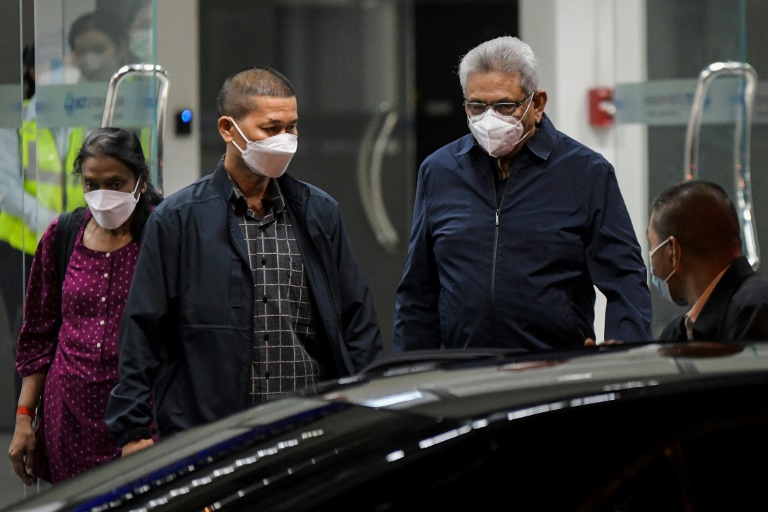Bankrupt Sri Lanka’s deposed president ‘to return home’

Former Sri Lankan president Gotabaya Rajapaksa (2nd R) has been living in a Thai hotel
Colombo – Bankrupt Sri Lanka’s deposed former president Gotabaya Rajapaksa is expected to end his self-imposed exile in Thailand and return home on Saturday, a top defence official told AFP.
The 73-year-old fled the island under military guard in July after a huge crowd stormed his official residence, following months of angry public protests blaming him for the island nation’s unprecedented economic crisis.
He issued his resignation from Singapore before flying onward to Bangkok, where he has been petitioning his successor to facilitate his return.
“He has been living in a Thai hotel as a virtual prisoner and was keen to return,” the defence official, who asked not to be named, told AFP on Friday. “We are told he will return very early on Saturday.”
“We have just created a new security division to protect him after his return on Saturday. The unit comprises elements from the army and police commandos.”
Sri Lanka’s constitution guarantees bodyguards, a vehicle and housing for former presidents.
Rajapaksa travelled to Thailand after Singapore declined to extend his 28-day visa, but security authorities in Bangkok told him not to step out of his hotel for his own safety.
The former president had a 90-day visa to remain in Thailand, but opted to return with his wife, a bodyguard and another aide, the official said.
Rajapaksa’s youngest brother, Basil, the former finance minister, met with President Ranil Wickremesinghe last month and requested protection to allow for the deposed leader’s return.
“Basil Rajapaksa requested the president to make arrangements for the former president to return home,” their Sri Lanka Podujana Peramuna (SLPP) party said in a statement.
Sri Lanka has endured months of acute food, fuel and medicine shortages, lengthy blackouts and runaway inflation after running out of foreign currency to finance essential imports.
The coronavirus pandemic was a hammer blow to the island’s tourism industry and dried up remittances from Sri Lankans working abroad — both key foreign exchange earners.
Rajapaksa, who was elected in 2019 promising “vistas of prosperity and splendour”, saw his popularity nosedive as hardships multiplied for the country’s 22 million people.
His government was accused of introducing unsustainable tax cuts that drove up government debt and exacerbated the crisis.
Rajapaksa’s resignation ended his presidential immunity, which could see the revival of stalled corruption cases against the former leader.
Wickremesinghe was elected by parliament to see out the remainder of Rajapaksa’s term. He has since cracked down on street protests and arrested leading activists.
